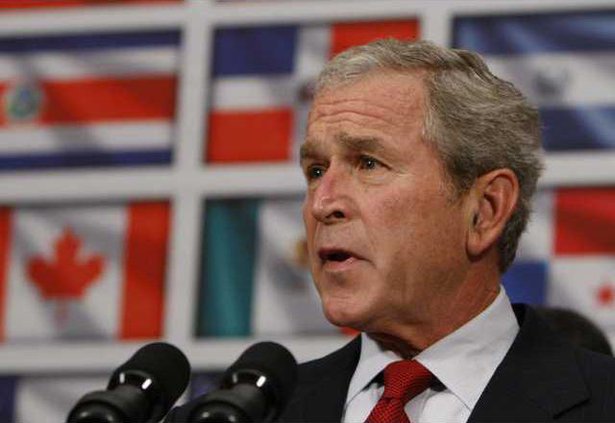UNITED NATIONS — The coalition of the willing that went to war in Iraq is becoming the coalition of the disappearing.
President Bush and Iraqi President Jalal Talabani formally thanked the diminishing band of allies at a meeting Tuesday night on the sidelines of the U.N. General Assembly. The low-key, low-profile gathering stood in stark contrast to the early days of Bush’s administration, when hot debates over the war formed the centerpiece of the annual global forum.
‘‘It’s a pleasure to be with nations that have helped your democracy grow,’’ Bush told Talabani in a room packed with representatives of more than two dozen countries that have contributed in Iraq. ‘‘A lot of people around the world have made sacrifices along with the Iraqi people to enable a country to emerge from the shadows of tyranny — become a hopeful example for nations around the world.’’
At its height, the U.S.-led coalition in Iraq included 50,000 troops from more than three dozen countries other than the United States. But by the next 90 days or so, that global coalition will shrink to just a handful of nations, according to White House advisers.
The White House says that isn’t because international support is dwindling, but because security gains and the increased capability of Iraqi forces allow outside forces to do more with less.
‘‘Many of the troops of the countries represented here have returned home, but they have done so on success,’’ Bush said at the reception.
Iraq is drafting bilateral agreements with the U.S. and other countries to replace a U.N. mandate that authorizes their presence now but which expires at year’s end. The White House has not disclosed the names of countries likely to remain in Iraq after the expiration of the U.N. mandate, saying it’s up to the Iraqi government to seal each agreement on its own.
The president was careful not to imply that all is well in Iraq.
Bush’s military buildup last year — along with several key local factors as well — did help to quell violence. But security gains were meant to provide breathing room for political reconciliation, and progress there has been spotty.
On Wednesday, Iraq’s parliament overwhelmingly approved a provincial elections law, setting the stage for local elections believed to be an essential step to building a long-term peace among the country’s rival religious and ethnic communities. Bush issued a statement of congratulations to Iraqi leaders for working together, saying ‘‘nothing is more central to a functioning democracy than free and fair elections.’’
Lasting power-sharing agreements have been elusive in Iraq so far. The law still needs approval by the country’s three-member presidential panel.
‘‘Mr. President, we’ve still got work to do,’’ Bush told Talabani. ‘‘But there is no doubt that the situation in Iraq has changed substantially.’’
According to a list provided by the White House, representatives of the following nations were recognized at the meeting for past or ongoing contributions: Albania, Australia, Azerbaijan, Bosnia-Herzegovina, Bulgaria, Czechoslovakia, Denmark, El Salvador, Estonia, Georgia, Hungary, Italy, Japan, Kazakhstan, South Korea, Latvia, Lithuania, Macedonia, Moldova, Mongolia, Montenegro, Netherlands, Poland, Romania, Slovenia, Tonga, Turkey and the United Kingdom.
‘‘I’m here on behalf of the Iraqi people to express my deepest appreciation for all countries who participated in the breaking Iraq from worst kind of dictatorship,’’ Talabani said. ‘‘I want to express my deepest condolences for your brave soldiers and civilians who have lost their lives while standing up for our shared values of freedom and democracy.’’
In the fall of 2002, Bush went to the United Nations and got a strong U.N. Security Council resolution demanding that former Iraqi President Saddam Hussein give up all unconventional weapons and open his country to new arms inspections. Former Secretary of State Colin Powell’s congressional testimony in early 2003 documenting Saddam’s weapons programs was based, as it turned out later, on faulty U.S. intelligence.
But when Bush went to war in Iraq in spring 2003, he did so without U.N. backing — amassing the coalition on his own instead, with often tiny contributions from other countries. The United States has always contributed the vast majority of troops — 250,000 out of 300,000 at its height.
Bush, Iraqi leader thank a dwindling coalition


Sign up for the Herald's free e-newsletter